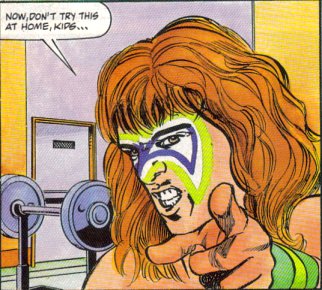
We Understand– They Are Not Grateful (Casanova)
June 11th, 2007 Posted by david brothersThe last comic I read, there was a lot of rape and crying. Kinda harshed my boner for fun, you know?
–Casanova Quinn, Casanova #2
Casanova (words by Matt Fraction, art by Gabriel Ba) can be explained in two lines from a Wu-Tang song:
Yo, too many songs, weak rhymes that’s mad long
Make it brief son, half short and twice strong
–The GZA (Genius), “As High As Wu-Tang Get”
That’s on Wu-Tang Forever, by the way.
Those two lines describe Casanova perfectly. Casanova has, save for the first issue, 16 pages per issue. The average comic has 22 pages. The missing pages are given up to behind the scenes-type text pieces and art showcases. In addition, the series so far is seven issues long, and each issue is a complete story unto itself. One complete mission for Casanova Quinn. The seven issues connect in an overarching way to form the first arc, Luxuria.
Casanova is one of the greatest comics of all time.
I’m trying to review this without ruining it for you, but I think the first issue may end up being a casualty of war. You see, Casanova Quinn is a thief. He’s suave, sophisticated, he’s like Han Solo but more honest with himself. He’s having fun living the life, but everything goes wrong.
Cass has a sister, Zephyr. She dies on a mission, which causes Cass to reconnect with his father Cornelius, the head of EMPIRE. Zephyr was the good twin, so to speak, and the jewel in her father’s eye. Where Cass went left, she went right. Both Cass and his father loved her… because she was not Cass.
After that, Cass’s world goes upside down. He ends up in a parallel universe, one where he died on a mission and his sister, Zephyr, is still alive. Only– things are different. Here, Zephyr is the evil twin. She works for Newman Xeno, noted criminal and head of WASTE. Newman Xeno wants an inside man in EMPIRE, and who better than the evil alternate universe twin of the son of EMPIRE’s top dog?
That’s right. Evil Twin and Evil Twin versus Daddy. What’s the word for that? Ultraoedipal?
Casanova’s dialogue is sharp and pop culture infused, but not in that kind of annoying too cute for it’s own good way that Joss Whedon does it. The characters have real motivations, and these are motivations are ones we can relate to. Cass doesn’t want to save the world, he just wants to do right by someone important to him. Zephyr loves thrills. Cornelius? He gets a good moment where he reconnects with his son.
Casanova has assassin pop stars, hyper-advanced cultures, robots, sex, a dude who creates robots to have sex with, and tons of other mad ideas– but it’s all about the character moments. The ending is real- everything that’s been building up throughout the series comes to bear and zigzags at the last moment, but in a way that feels right. The relationship between Cass and Zephyr alone is a complicated one, and veers from simple sibling rivalry to outright malice, but in this weirdly familial way.
Gabriel Ba’s art works, too. There’s a few panels that are just pitch perfect. The scene where Cass attempts to kidnap a certain man who may or may not be a god is poetry in motion, from eye-opening to “I don’t believe in you.” There’s a panel of someone crying really late in the book that yanks your heartstrings something fierce.
This, along with David Aja’s work in Iron Fist, is some fine, fine work that really brings things to a newer or more experimental level. There are a lot of scenes that really could’ve come off like crap under a less skilled pen. The god scene, yeah, and there’s also a scene where Cass is pretty much reduced to a two-dimensional being and the art totally sells it. He turns into non-toned black lines with no shading at all, and you instantly get the point. Writing-wise, there’s an issue where each page is one of three moments in time and they cycle throughout the issue. Easily could’ve fallen flat– but it works. The art sells it and it ends up working.
Casanova is a brave comic, dense, and better for it. Matt Fraction and Gabriel Ba took a chance and poured distilled quality into sixteen pages. It never stops being interesting, because each issue is like an infodump of fictional and real information. The “savages” from one issue of Casanova are loosely based on a real people, the last living vestige of neolithic society in the modern day. An island of the past sitting in the present.
Casanova is half short, almost, and twice strong. It’s a strong work, and the recently released hardcover is definitely worth your purchase. It’s got more stuff in it than Marvel’s Civil War megahitblockbusterpieceofcrap. Even better– it’s fun.
edit, the next day: I screwed up and forgot to talk about the text pieces from Fraction and art showcase from Ba. Anyway, in exchange, Fraction love from back in the day: Perfection in Slices and A Few Good Comics, wherein I do talk about the backmatter a little.






